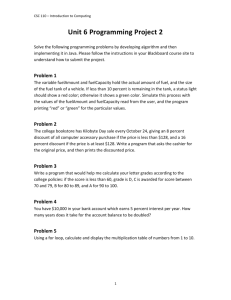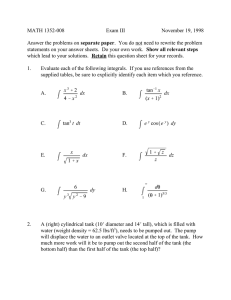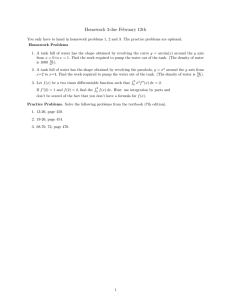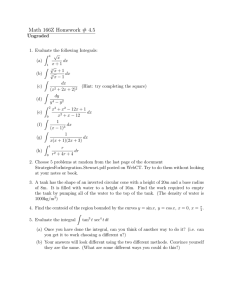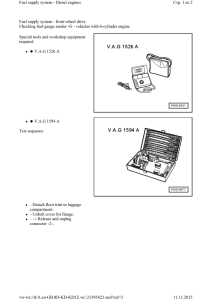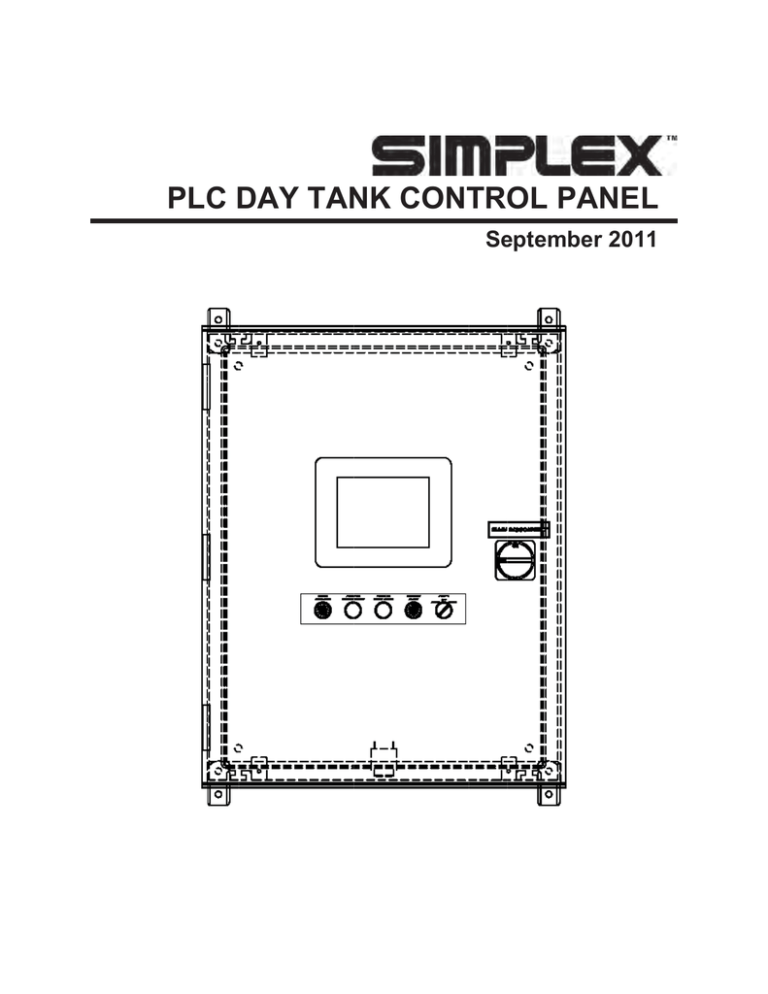
PLC DAY TANK CONTROL PANEL
September 2011
PLC Day Tank Control Panel • page 1 of 8
Contents
PRIMARY INSPECTION ............................................................... 2
INSTALLATION............................................................................. 2
OPERATION.................................................................................. 2
Automatic Operation ............................................................. 3
Manual Operation ................................................................... 4
DRAWINGS AND PARTS LIST .................................................... 5
APPENDIX A - ABBREVIATIONS USED IN THIS MANUAL....... 6
APPENDIX B - TECHNICAL DATA .............................................. 7
The information herein is the property of Simplex, Inc. and/or its subsidiaries.
Without written permission, any copying, transmitting to others, and other use
except that for which it is loaned, is prohibited.
Simplex, Inc., 5300 Rising Moon Road, Springfield, IL 62711-6228 • 217-483-1600 • Fax 217-483-1616
© 2011 Simplex, Inc. All Rights Reserved. • Printed in the USA. • www.simplexdirect.com
PLC Day Tank Control Panel • page 2 of 8
PRIMARY INSPECTION
OPERATION
Preventative visual inspection of the
shipping crate, Remote Pump Unit,
and accessories must be performed
before installation. Physical or electrical
problems due to handling and vibration
may occur during shipment.
1. If the packing crate shows signs of
damage inspect the controller for
damage. Check the entire outside
of the controller for damage which
could cause internal mechanical or
electrical problems.
2. Check main disconnect switch, door
and hinge operation.
3. Check all electrical terminals and
connections for tightness.
The PLC Level Controller nameplate
contains the Day Tank operation status
indicators and controls. The control
panel is the central point for Day Tank
operation and is where the Day Tank
operating mode is selected.
INSTALLATION
1. Properly mount and attach all components as shown in the dimensional
drawings using the mounting feet/
holes provided.
2. Connect all components to earth
ground at ground studs provided as
shown on the electrical drawings.
Unit must be grounded for operator
safety.
3. If equipped, install level and alarm
indication accessories as shown on
dimensional drawing and connect
them to the Control Panel as shown
on the electrical drawings.
4. If equipped, connect dry alarm contacts for customer use per specifications on the electrical drawings.
5. Connect control power to the Control Panel per specifications on the
electrical drawings.
This manual represents a
generic configuration. Please
refer to the operator's manual
supplied with your equipment.
The PLC Day Tank control panel contains the following components:
1. Indicator Lights:
a. Power Available
b. Summary Alarm
2. Press to Reset Alarm push-button
3. Press to Silence Alarm push-button
4. Fill Pump 1 / Day Tank Auto-OffHand switch
5. HMI Touch-screen Controls and
Indicators:
a. Fill Pump 1 / Day Tank Filling
b. Fill Pump 1 / Day Tank Call For
Fuel Runtime
c. Day Tank Fuel Level – Percent
d. Day Tank Fuel Level – Gallons
e. Test Fill push-button
f. View Alarms push-button
g. Leak Detected Indicator
h. Day Tank Fuel Level Indication –
Graphically
i. Day Tank Fuel Level Indication
a. High-High – 98%
b. High – 95%
c. Full Tank/Fill Stop – 90%
d. Fill Start – 50%
e. Low – 25%
f. Low-Low – 10%
Each of these controls and indicators
has a specific function and is described
in the Automatic and Manual operation
sections.
Simplex, Inc., 5300 Rising Moon Road, Springfield, IL 62711-6228 • 217-483-1600 • Fax 217-483-1616
© 2011 Simplex, Inc. All Rights Reserved. • Printed in the USA. • www.simplexdirect.com
PLC Day Tank Control Panel • page 3 of 8
WARNING!! Always connect the
Day Tank and Controller to an earth
ground before Day Tank operation!
Electrical shock can cause personal
injury or death!
The programmable logic controller gets
the tank level from the Day Tank’s level
transducer to energize and de-energize
fill pumps as necessary to maintain
proper fuel levels within the Day Tank.
Day Tank level float-switches work in
parallel with the level transducer should
a transducer failure occur. As the fuel
level rises and falls, the level transducer
is continually calibrated based on the
float-switch activation points.
AUTOMATIC OPERATION
The Fill Pump 1/Day Tank Auto-OffHand mode switch is provided to allow
the operator complete control over the
Day Tank. The 3-position mode switch
should be placed in the AUTO mode for
automatic, hands-free operation. As the
prime mover consumes fuel, the Day
Tank will cycle through the normal fuel
range as determined by the fuel level
transducer. This normal operating range
is Fill Start – 50% through Full Tank/Fill
Stop – 90%. The control panel HMI will
continuously, visually annunciate the
fuel level in the Day Tank from both the
level transducer and the individual floatswitch indicators. Automatic operation
is explained below.
The operator selects the AUTO mode
via the Fill Pump 1/Day Tank 3-position switch. As fuel is consumed the
level drops below the Fill Start-50%
level and a fill pump is energized via
relay contact closure. As fuel enters
the Day Tank, the fuel level rises to the
Full Tank/Fill Stop-90% level, at which
time the relay contacts open and the
fill pump will be de-energized. During
a pump running condition, a customer
supplied, normally closed, flow switch is
WARNING
Ground must be connected as
shown in the wiring drawing.
Failure to properly ground the
unit will result in a fire and personnel safety hazard.
monitoring fuel progression and should
the flow switch not detect sufficient fuel
motion for a period of 30 seconds, the
relay contacts open and the fill pump
is de-energized and considered failed.
Once a loss of flow condition is detected,
an indicator is illuminated on the HMI
touch-screen, an alarm horn will sound,
and the fill pump is locked from use
until the condition is reset by pressing
the Reset Alarm push-button. During
normal automatic, operation, fuel is
consumed and replenished as necessary and the Day Tank cycles between
the 50% and 90% levels.
DAY TANK HIGH-HIGH FUEL
High-High – 98% fuel level detection is
provided as a redundant backup to the
High – 95% fuel level. Should the Day
Tank fuel level reach a High-High-98%,
the pump start contacts will open, the
fill pump will stop and no further fill start
requests will be generated until the fuel
level within the Day Tank is lowered
below the High-95% level. Visual indicators will be illuminated on the HMI
touch-screen and an alarm horn will
sound. Once the fuel level has been
lowered, the Reset Alarm push-button
must be pressed to resume normal Day
Tank operations.
DAY TANK HIGH FUEL
High – 95% fuel level detection is provided as a redundant backup to the
Full Tank/Fill Stop – 90% fuel level,
such that, should the Fill Stop fail to
engage, the High 95% performs backup
functionality to open the pump start relay
Simplex, Inc., 5300 Rising Moon Road, Springfield, IL 62711-6228 • 217-483-1600 • Fax 217-483-1616
© 2011 Simplex, Inc. All Rights Reserved. • Printed in the USA. • www.simplexdirect.com
PLC Day Tank Control Panel • page 4 of 8
contacts, de-energize the fill pump and
halt any further fuel entry into the Day
Tank. The Day Tank High fuel alarm
indicates the fuel level has reached or
exceeded 95%. Should the Day Tank
fuel level reach a High-95%, the pump
start contacts will open, the fill pump will
stop and no further fill start requests will
be generated until the fuel level within
the Day Tank is lowered below the
High-95% level. Visual indicators will
be illuminated on the HMI touch-screen
and an alarm horn will sound. Once the
fuel level has been lowered, the Reset
Alarm push-button must be pressed to
resume normal Day Tank operations.
LOW FUEL LEVEL
Should the Day Tank fuel level reach
a Low-25%, visual indicators will be
illuminated on the HMI touch-screen
and an alarm horn will sound. Once the
fuel level has been increased above the
25% level, the Reset Alarm push-button
must be pressed to resume normal Day
Tank operations.
LOW-LOW FUEL LEVEL
Should the Day Tank fuel drop below
the Low-Low – 10% level, the operator
should consider generator shutdown to
prevent fuel starvation to the generator
injectors. Dry contacts are provided
as means of automatically stopping
generator operations on a Low-Low
fuel level detection. Should the Day
Tank fuel level reach a Low-Low-10%,
visual indicators will be illuminated on
the HMI touch-screen and an alarm
horn will sound. Once the fuel level has
been increased above the 10% level,
the Reset Alarm push-button must be
pressed to resume normal Day Tank
operations.
DAY TANK LEAK
Should a Day Tank Leak condition occur, this indicates the inner tank has
ruptured and allowed fuel detection
within the secondary containment. Upon
a Day Tank Leak detection, the pump
start contacts will open, the fill pump will
be de-energized and no further fill start
requests will be generated to prevent
any further fuel entry into the Day Tank.
Should a Day Tank Leak be detected,
a visual indicator will be illuminated on
the HMI touch-screen and an alarm
horn will sound. Once the fuel leak
has been resolved and the secondary
containment drained, the Reset Alarm
push-button must be pressed to resume
normal Day Tank operations.
MANUAL OPERATION
For Manual (continuous run) Day Tank
operations, the operator must choose
the HAND mode on the Pump 1/Day
Tank 3-position mode switch. This will
generate a Fill Start request, close the
relay contacts, and energize the fill
pump to increase the fuel level within
the Day Tank. Caution must be used
when in the Manual mode and the Day
Tank should never be left unattended.
Manual mode allows the Day Tank to
acquire the High-95% fuel level, at which
time the High fuel alarm will be annunciated, the Fill Start contacts will open,
and the fill pump will be de-energized.
Once the fuel level is brought down to
below the High-95% level, the reset
alarm push-button must be pressed to
resume normal Day Tank operations.
By placing the Pump 1/Day Tank 3-position switch back in the AUTO mode,
the Day Tank will resume hands-free,
automatic operation and maintain fuel
levels between the 50% and 90% range.
Should general maintenance or repairs
be required, the OFF mode is provided.
TEST FILL PUSH-BUTTON
A Test Fill push-button is provided on
the HMI/Touch-screen to confirm Day
Tank fill functionality. With the Pump 1
/ Day Tank in the Auto mode and the
Simplex, Inc., 5300 Rising Moon Road, Springfield, IL 62711-6228 • 217-483-1600 • Fax 217-483-1616
© 2011 Simplex, Inc. All Rights Reserved. • Printed in the USA. • www.simplexdirect.com
PLC Day Tank Control Panel • page 5 of 8
fuel level below the Full Tank/Fill Stop
– 90% level, the operator may press
and release the Test Fill push-button to
generate a Fill Start contact closure and
energize a fill pump. This will increase
the Day Tank fuel level to the Full Tank/
Fill Stop-90% level, at which time the
relay contacts open and the fill pump
will de-energize.
DAY TANK CALIBRATION
RESET ALARMS PUSH-BUTTON
By pressing the Calibrate Level pushbutton on the HMI/Touch-screen, the
operator can accurately set the Day
Tank level for the level transducer.
The Day Tank Calibration routine requires the operator to enter an upper
fuel level setting and a lower fuel level
setting. Best results are obtained if the
operator can increase the fuel to the
Full Tank/Fill Stop – 90% level for the
upper setting and then reduce the fuel
to the Low-Low – 10% level for the
lower setting. Graphical and text-based
displays inform the operator at all times
of the upper and lower fuel levels. After
the calibration process is complete, the
operator may return to the main Day
Tank status screen.
The Reset Alarm push-button is used
to reset any alarm condition, should
they occur.
DRAWINGS AND
PARTS LIST
ALARM HORN SILENCE PUSHBUTTON
Should an alarm condition occur, such
as High-High Fuel, High Fuel, Low Fuel,
Low-Low Fuel, or Day Tank Leak, the
alarm horn will energize. By pressing
the alarm horn silence push-button, the
alarm horn can be silenced.
POWER AVAILABLE LIGHT
To confirm control power is present
within the Day Tank control panel,
the power available light will remain
illuminated.
SUMMARY ALARM LIGHT
A Summary Alarm light is contained on
the Day Tank control panel to indicate
the presence of an alarm condition,
should one occur. This allows the operator to monitor the panel from a distance
for any possible alarms. Should an
alarm condition exist, the operator can
investigate more detailed information on
the HMI/Touch-screen contained within
the Day Tank control panel.
The drawings included in this manual
are the most accurate source of part
numbers for your Pump Set. When
ordering replacement parts for Simplex
Pump Sets, always consult the Parts
Legend Drawing. When contacting the
Simplex Service Department always
have your work order and drawing number ready for reference. The Work Order
Number and the Drawing Numbers are
also located on each drawing legend.
Simplex, Inc., 5300 Rising Moon Road, Springfield, IL 62711-6228 • 217-483-1600 • Fax 217-483-1616
© 2011 Simplex, Inc. All Rights Reserved. • Printed in the USA. • www.simplexdirect.com
PLC Day Tank Control Panel • page 6 of 8
APPENDIX A - ABBREVIATIONS USED IN THIS MANUAL
Listed below are abbreviations of terms found on Fuel Supply Systems. When following a drawing utilize this guide to define abbreviated system and component
names. As this is a master list, drawings and text pertaining to your equipment may
not contain all these terms.
AC-Alternating Current
AHR-Alarm Horn Relay
AR-Alarm Horn
BPRV-Back Pressure Regulating
Valve
BRK-Motor/Pump Bracket
BV-Ball Valve
C-Contactor
CB-Ciruit Breaker
CSR-Check Strainer Relay
CV-Check Valve
DC-Direct Current
DPDT-Double Pole Double Throw
F-Fuse
FLS-Flowswitch
FS-Floatswitch
FSR-Simplex Fuel Strainer
GA-Gauge
GAL-Gallons
GPM-Gallons Per Minute
HFL-High Fuel Level Relay
HG-Mercury
HP-Horsepower
HZ-Hertz
I.D.-Inside Diameter
JB-Junction Box
Hz-Hertz
INHG-Inches of Mercury
L-Lamp
L.E.D.-Light Emitting Diode
LAFD-Los Angeles Fire Department
LFF-Loss of FLow Relay
LFL-Low Fuel Level Relay
LPR-Low Pressure Relay
MDB-Main Distribution Block
MDS-Main Disconnect Switch
MOT-Motor
N.C.-Normally Closed
NEC-National Electric Code
NEMA-National Electric
Manufacturers Association
NFPA-National Fire Protection Association
N.O.-Normally Open
NP-Nameplate
NPT-National Pipe Thread
O.D.-Outside Diameter
OLR-Over Load Relay
OPT-Option
PCB-Printed Circuit Board
PCRX-Pump Control Relays
PG-Pressure Gauge
PLR-Pipe Leak Relay
PRV-Pressure Relief Valve
PS-Pressure Switch
PSI-Pounds Per Square Inch
PSR-Pressure Switch Relay
PRR-Pump Running Relay
SC-Swing Check Valve
SOL-Solenoid
SST-Simplex Super Tank
TB-Terminal Block
T-Control Transformer
TDR-Time Delay Relay
TEFC-Totally Enclosed, Fan Cooled
THR-Tank Heater Control Relay
TS-Transducer Pressure Switch
V-Voltage
VAC-Voltage, Alternating Current
VDC-Voltage, Direct Current
VG-Vacuum Gauge
Simplex, Inc., 5300 Rising Moon Road, Springfield, IL 62711-6228 • 217-483-1600 • Fax 217-483-1616
© 2011 Simplex, Inc. All Rights Reserved. • Printed in the USA. • www.simplexdirect.com
PLC Day Tank Control Panel • page 7 of 8
APPENDIX B - TECHNICAL DATA
Thermal expansion of oil is approximately
1 cubic inch per 1 gallon per 10°F rise in
temperature.
Hydraulic Formulas
Horsepower =
Torque (lb. in.) =
GPM x PSI
1714
CU IN./REV. x PSI
2
Torque (lb. in.) = HP X 63025
RPM
Flow (gpm) = CU IN./REV x RPM
231
Head and Pressure
Equivalents
Conversion Factors
1HP = 33,000 ft. lbs. per minute
1HP = 42.4 btu per minute
1HP = 0.746 kwhr (kilowatt hours)
1 U.S. gallon= 231 cubic inches
Pipe Volume varies as the square of the diameter; volume in gallons = 0.0034 D 2 L where:
D=inside diameter of pipe in inches;
L=length in inches
Velocity in feet per sec.=
0.408 x flow (gpm)
D2
where:
D=inside diameter of pipe in inches
Atmospheric pressure at sea level = 14.7PSI
Atmospheric pressure decreases
approximately 0.41PSI for each one thousand
feet of elevation up to 23,000 feet.
When converting pressure from feet of water to
P.S.I., the specific gravity of the liquid must be
considered.
Pressure (PSI) = feet head x 0.433 x specific
gravity
Here are some typical conversion figures:
Specific gravity of oil is approximately 0.85.
1 P.S.I.=2.30 feet of water
(specific gravity 1.0)
1 P.S.I.=2.88 feet of oil
(specific gravity 0.8)
PRESSURE AND
CONVERSION TABLE
Feet
Water
PSI
Oil
PSI
Water
1
2
3
4
5
10
15
20
25
30
35
40
45
50
55
60
65
70
75
80
85
90
.35
.70
1.05
1.4
1.75
3.5
5.2
7.0
8.7
10.5
12.2
14.0
15.7
17.5
19.2
21.0
22.7
24.5
26.2
28.0
29.7
31.5
.43
.87
1.3
1.73
2.17
4.33
6.5
8.66
10.8
13.0
15.2
17.3
19.5
21.7
23.9
26.0
28.1
30.5
32.5
34.6
36.8
39.0
Simplex, Inc., 5300 Rising Moon Road, Springfield, IL 62711-6228 • 217-483-1600 • Fax 217-483-1616
© 2011 Simplex, Inc. All Rights Reserved. • Printed in the USA. • www.simplexdirect.com
PLC Day Tank Control Panel • page 8 of 8
Pipe Friction- Fuel Oil 2
FLAMMABLE
LIQUIDS
FLASH POINTS
Pressure Drop in PSI per 100 feet of Pipe and Tube
NOMINAL SIZES - INSIDE DIAMETERS
Pipe
Size,
In.
2.0
GPM
7.0
GPM
10.0
GPM
17.0
GPM
23.0
GPM
30.
GPM
.50
2.337
24.65
56.10
148.75
233.75
408.00
3.61
7.31
21.25
39.53
64.6
93.5
182.75
.75
40.0
GPM
50.0
GPM
Flash Points
°F(°C)
1.00
.306
2.00
4.16
11.70
19.55
31.87
54.40
80.75
1.25
.10
.51
1.00
2.55
5.10
8.50
14.88
22.10
.23
.425
1.10
2.04
3.27
5.70
8.33
2.00
.13
.34
.60
.96
3.10
2.38
2.50
.10
1.62
.30
.51
.94
1.275
.10
1.74
3.06
4.93
1.5
3.00
Excerpts from NFPA 325, “Fire
Hazards properties of Flammable
Liquids...”
NOTE: Pipe sizes shown apply to standard weight schedule 40 pipe.
Tube is standard copper tubing
Specific Gravity and Viscosity of Oils
*Specify
Gravity
At 60°F
Oils
Auto Lubricating
S.A.E.10 Max.
20 Max.
30 Max.
40
50
60
70
10W
20W
Fuel OilDiesel No. 2D
Diesel No. 3D
Diesel No. 4D
Diesel No. 5D
No. 1
No. 2
No. 3
No. 5A
No. 5B
No. 6
Navy Spec.
Navy II
TurbineHeavy
Light
Viscosities In SSU at Various Temperatures
30°F
.880 to .935
.880 to .935
.880 to .935
.880 to .935
.880 to .935
.880 to .935
.880 to .935
.880 to .935
.880 to .935
4,400
6,900
13,000
25,000
58,000
100,000
.82 to .95
.82 to .95
.82 to .95
.82 to .95
.82 to .95
.82 to .95
.82. to .95
.82 to .95
.82 to .95
.82 to .95
.989 Max.
1.0 Max.
.91 Avg.
.91 Avg.
4,800
770
60°F
80°F
100°F
130°F
170°F
210°F
250°F
1,090
1,650
2,700
4,850
10,000
15,000
22,000
430
750
1,200
2,000
3,700
5,300
7,500
240
400
580
950
1,600
2,300
3,100
120
185
255
380
600
800
1,050
66
90
120
150
220
285
342
57
66
80
105
128
150
49
55
67
76
86
138
390
4,400
16,500
70
145
700
3,500
53.6
92
280
1,500
39
48
70
320
39
44.2
136
76.5
54
104
126
1,480
850
56
68
420
600
72,000
1,100
24,000
45.5
53
215
490
21,500
600
8,600
45.5
65
140
750
35
40
45
125
400
7,800
360
3,500
39
72
315
2,150
190
1,150
48
235
590
100
370
178
225
66
160
141
110
50.2
89
1,280
330
625
208
350
138
170
87
86
58.8
3,300
Diesel Fuel Oil
No. 1-D
100 Min. (38)
or Legal
Diesel Fuel Oil
No. 2-D
125 Min. (52)
or Legal
Diesel Fuel Oil
No. 4-D
130 Min. (54)
or Legal
Fuel Oil No. 1
(Kerosene)
(Range Oil)
(Coal Oil)
100-162
(43-72)
Fuel Oil
No.2
126-204
(52-96)
Fuel Oil
No. 4
142-240
(61-116)
Fuel Oil No. 5
Light
Fuel Oil No. 5
Heavy
156-336
(69-169)
160-250
(71-121)
Fuel Oil
No. 6
150-270
(66-132)
Jet Fuels
Jet A and A-1
110-150
(43-66)
Jet Fuels
Jet B
-10 to +30
(-23 to -1)
Jet Fuels
JP-4
-10 to +30
(-23 to -1)
Jet Fuels
JP-5
95-145
(35-63)
57
Simplex, Inc., 5300 Rising Moon Road, Springfield, IL 62711-6228 • 217-483-1600 • Fax 217-483-1616
© 2011 Simplex, Inc. All Rights Reserved. • Printed in the USA. • www.simplexdirect.com

